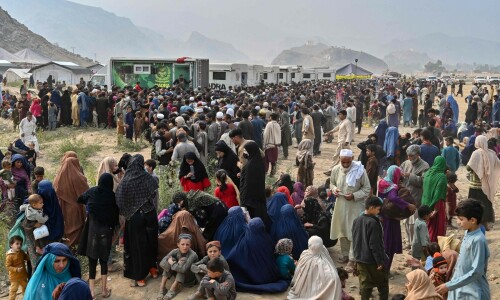The repatriation process of the illegal migrants is steadily continuing and more than 68,000 people have returned to Afghanistan in the past two days. According to government statistics, approximately 150,000 illegal individuals have voluntarily returned before the deadline ends, while the deportation process has been kicked off by all federating units alongside voluntary returns. As said, over 56,000 Afghans have been returned through the Torkham crossing and 12,000 returned through the Spin Boldak gate on the Pak-Afghan border. The government of Pakistan making all-out efforts to ensure a smooth, peaceful and dignified repatriation of all illegal migrants, while multiple screening and holding centres have been established in Sindh, Balochistan and Khyber Pakhtunkhwa. The provincial administrations have set up transit camps at Torkham and Spin Boldak to help facilitate Afghan refugees’ peaceful transition to their home country.
As the repatriation process has commenced in the past days, certain issues relating to Afghan refugees, their belongings, assets, vehicles etc have been raised that warrant special focus of the authorities. According to reports, the verification of individuals, and scanning of their households loaded in the vehicles is a lengthy process and clearance at the border crossing points is also slow. Furthermore, the government of Pakistan has set a fifty thousand limit for cash transfers with each family whereas the majority of Afghan refugees have sold out their properties, households and other physical assets before repatriation thus a ban/ limit of cash and no availability of banking channel in Afghanistan causes great embarrassment for them at the final stage. During the recent visit of the Afghan Charge’d affairs to the Turkham border, the Afghan envoy advocated for the exemption of vehicles used for the transportation of refugees from any charges.
According to government statistics, there are some 1.7 million undocumented Afghan refugees, while several lacs other illegal migrants from Iran, India, Bangladesh and Central Asian Republics are residing in the country. After the deadline ends, the process of forced repatriation has begun alongside the voluntary return of all migrants who are not registered with the Pakistani government and UNHCR. Historically, the Afghan refugees have spent nearly four decades in this country and almost half of their population was born and raised in this nation. A majority of them owe movable and immovable assets including homes, shops, vehicles, plots, local as well as foreign currency which they earned from their businesses, and hard work during their stay in Pakistan. Therefore, the Afghan refugees’ concerns relating to their property and assets and their shifting to Afghanistan is a genuine issue and it must be resolved on an urgent basis. Although, the provincial and federal governments are working day and night to facilitate the smooth and respectful return of illegal migrants and the administration has issued special instructions to LEAs and civil administration to exercise special care while dealing with Afghan refugees so no single refugee is hurt/displease during this process.
The government and the people of Pakistan have extended historic hospitality to their Afghan brothers and sisters over the past four decades while the Afghan refugees not only made their livelihood in this nation but also played a constructive role in the development and prosperity of this country. Unfortunately, Pakistan struck into endless economic and security crises while the involvement of Afghan nationals in terrorist activities against Pakistan, smuggling of highly needed commodities, foreign currency, drugs and street crimes sensitized the Pakistani government to take its house in order and streamline all domestic, foreign and security policies. The repatriation of illegal migrants was a difficult decision for Pakistani leaders’ yet it was unavoidable for the protection, safety and well-being of the 240-million-strong nation. The government and the people of Pakistan still owe good wishes and hope for a prosperous future for returnees Afghan nationals. Meanwhile, Pakistan’s border gates and Pakistanis’ hearts will always remain open for them, when they will come through the legal process in the future.







